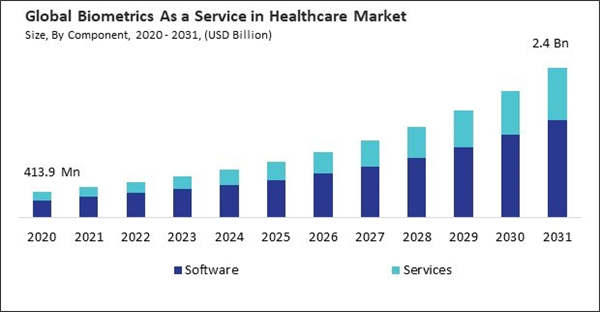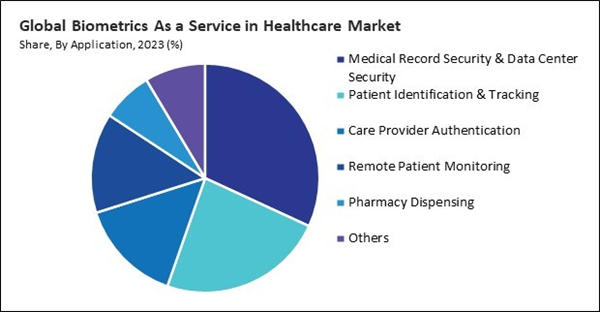By capturing biometric data at the point of care, healthcare organizations can expedite patient check-in, reduce wait times, and improve the efficiency of clinical operations, enhancing patient satisfaction and care delivery. Thus, the patient identification & tracking segment recorded 23.5% revenue share in the market 2023. Biometric authentication solutions enhance medication safety and administration by accurately identifying patients and matching them with prescribed medications.
The pandemic increased reliance on remote patient monitoring and home-based care options to reduce the burden on healthcare facilities while minimizing the danger of virus exposure. Biometric authentication enables secure access to remote monitoring systems and medical devices, facilitating the delivery of virtual care services to patients in their homes while ensuring data privacy and security. Thus, the COVID-19 pandemic had a positive effect on the market.
Biometric authentication streamlines access to patient health records within HIE networks, improving interoperability and workflow efficiency across healthcare systems. Healthcare professionals can more effectively coordinate patient care and make decisions by having secure access to patient data from various sources without needing separate login credentials.
Additionally, Healthcare providers can monitor patients' biometric data and health conditions remotely with mHealth systems that frequently have remote patient monitoring features. Biometric authentication guarantees the security of access to these monitoring systems. Thus, because of the rise of mobile health (mHealth) solutions, the market is anticipated to increase significantly.
However, Interoperability challenges may result in complex data exchange workflows and manual data entry processes, increasing the risk of errors, inconsistencies, and data inaccuracies. Healthcare providers may struggle to navigate disparate systems, interfaces, and data formats when accessing patient information or performing biometric authentication tasks, leading to workflow inefficiencies and user frustration. Therefore, interoperability challenges in flow meters are a significant challenge that hampers the growth of market.
By Component Analysis
By component, the market is categorized into software and services. In 2023, the software segment held 68.3% revenue share in the market.By Solution Type Analysis
On the basis of solution type, the market is divided into fingerprint scanning, facial recognition, iris recognition, voice recognition, palm & vein recognition, and others. The facial recognition segment garnered 14.5% revenue share in the market in 2023.By Modality Analysis
Based on modality, the market is bifurcated into unimodal and multimodal. In 2023, the multimodal segment witnessed 61.7% revenue share in the market.By Application Analysis
By application, the market is classified into patient identification & tracking, medical record security & data center security, care provider authentication, remote patient monitoring, pharmacy dispensing, and others. The care provider authentication segment procured 14.5% growth rate in the market in 2023.By End Use Analysis
Based on end user, the market is segmented into hospitals & clinics, long term care centers & home care settings, ambulatory surgical centers, and others. The long-term care centers & home care settings segment covered 23.6% revenue share in the market in 2023.By Regional Analysis
Region-wise, the market is analysed across North America, Europe, Asia Pacific, and LAMEA. In 2023, the Asia Pacific region acquired 27.5% revenue share in the market. Rising healthcare spending and investments in healthcare infrastructure across Asia Pacific countries.Recent Strategies Deployed in the Market
- Dec-2023: Hitachi, Ltd. came into partnership with Concordium Foundation, a Swiss permissionless Layer 1 blockchain provider company. Through this acquisition, Hitachi, Ltd. would enhance convenience and mitigate risks linked to the multi-word seed phrase commonly utilized for wallet recovery in case of loss. Additionally, Hitachi's Public Biometric Infrastructure (PBI) platform merges biometric authentication with digital signatures based on public key infrastructure. Biometric data is not stored directly, thus eliminating the risk of leakage.
- Sep-2023: HID Global Corporation came into partnership with Certify Health, a US-based Hospital and Health Care. Through this partnership, HID Global Corporation would enhance patient care and satisfaction, and unveile a novel patient engagement solution featuring facial recognition technology. This innovation aims to modernize healthcare operations and provide enhanced service experiences for patients.
- Oct-2023: Thales Group S.A. introduced the "SafeNet IDPrime FIDO Bio Smart Card" a security key. The latest contactless smart card enables users to access enterprise devices, applications, and cloud services swiftly and securely by utilizing a fingerprint instead of relying on a password.
- Jun-2023: Hitachi, Ltd. came into partnership with Panasonic Connect Co., Ltd., a transportation, logistics, supply chain and storage company. Through this partnership, Hitachi, Ltd. would develop a new service that combines Hitachi's technology for preventing biometric data leakage with Panasonic Connect's facial recognition technology.
- Nov-2022: NEC Corporation introduces a multimodal biometric authentication solution showcasing the world's leading face recognition and iris recognition technologies. This solution facilitates rapid and precise authentication, boasting a false acceptance rate of less than one in 10 billion, simply by having an individual face the authentication device.
List of Key Companies Profiled
- Hitachi, Ltd. (Hitachi Astemo, Ltd.)
- Fujitsu Limited
- NICE Ltd.
- Thales Group S.A.
- HID Global Corporation (Assa Abloy AB)
- NEC Corporation
- BIO-key International, Inc.
- IDEMIA SAS (Advent International, Inc.)
- Cognitec Systems GmbH
- Suprema, Inc.
Market Report Segmentation
By Component- Software
- Services
- Fingerprint Scanning
- Facial Recognition
- Iris Recognition
- Voice Recognition
- Palm & Vein Recognition
- Others
- Multimodal
- Unimodal
- Medical Record Security & Data Center Security
- Patient Identification & Tracking
- Care Provider Authentication
- Remote Patient Monitoring
- Pharmacy Dispensing
- Others
- Hospitals & Clinics
- Long term care centers & home care settings
- Ambulatory Surgical Centers
- Others
- North America
- US
- Canada
- Mexico
- Rest of North America
- Europe
- Germany
- UK
- France
- Russia
- Spain
- Italy
- Rest of Europe
- Asia Pacific
- China
- Japan
- India
- South Korea
- Australia
- Malaysia
- Rest of Asia Pacific
- LAMEA
- Brazil
- Argentina
- UAE
- Saudi Arabia
- South Africa
- Nigeria
- Rest of LAMEA
Table of Contents
Companies Mentioned
- Hitachi, Ltd. (Hitachi Astemo, Ltd.)
- Fujitsu Limited
- NICE Ltd.
- Thales Group S.A.
- HID Global Corporation (Assa Abloy AB)
- NEC Corporation
- BIO-key International, Inc.
- IDEMIA SAS (Advent International, Inc.)
- Cognitec Systems GmbH
- Suprema, Inc.










